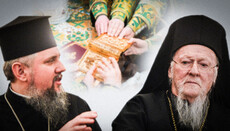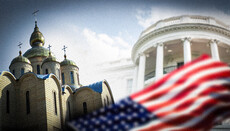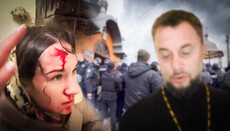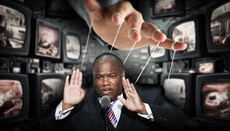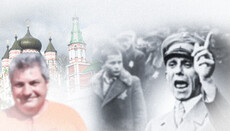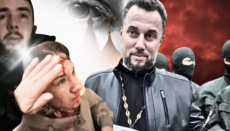Uncle Sam's сlerics: State Department’s role in the creation of OCU
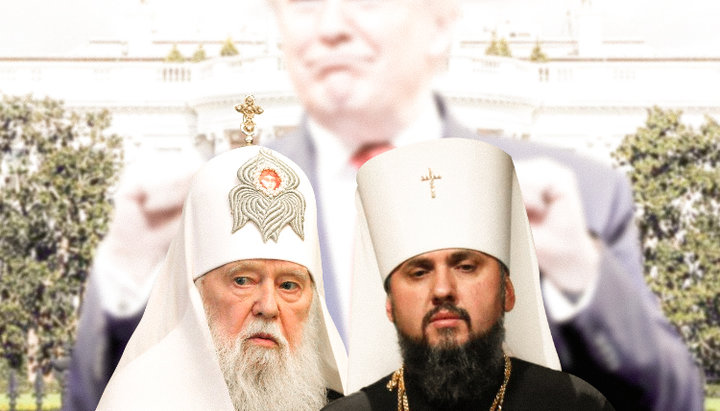
How representatives of the US Department of State created the OCU and forced the Orthodox Churches to recognize it.
On November 22, 2019, the U.S. Ambassador to Greece, Geoffrey Pyatt, immediately after returning from Washington, met with the head of the Greek Orthodox Church, His Beatitude Archbishop Ieronymos. The diplomat assured the Primate that "the issue of the Church of Ukraine is hotly debated in the American capital” and on behalf of the Ambassador for International Religious Freedom, Samuel Brownback, thanked for recognising the OCU.
It would seem that the formation of a new religious structure should not worry the American government. However, in reality, the idea of creating a religious organization in Ukraine, entirely dependent on the Phanar, was warmly supported at all stages by the US Department of State. Moreover, numerous facts indicate that the State Department not only welcomes this idea but also promotes it in every way at the pan-Orthodox level.
State Department and OCU: support
At the end of September 2018, i.e. a few months before the OCU’s formation, the President of Ukraine Petro Poroshenko, the head of the Kiev Patriarchate Filaret Denisenko and the then Metropolitan Simeon (Shostatsky) of Vinnitsa and Bar of the UOC appeared in the USA at the same time.
At that time, many were convinced that it was the latter who should take the post of head of a new religious structure because he had excellent relations with Poroshenko and was almost the only (later Metropolitan Alexander (Drabinko) joined him) canonical bishop among the future "hierarchs" of the OCU, whose ordination was not questioned in the Orthodox world.
However, Filaret was well aware that if Met. Simeon became the head of the new organization, then he himself would have nothing to do there. That is why he also went to the USA in September in order to enlist the support of American officials in the struggle for his own future.
The game that Denisenko started overseas was, in his opinion, justified. After all, being an experienced participant in various political battles, Filaret understood that everything was decided in Washington.
Back in April 2018, information began to appear that the State Department was exerting serious pressure on Patriarch Bartholomew in order to grant Ukrainian schismatics autocephaly.
In early August 2018, the Ambassador of Ukraine to the United States Valery Chaly said that the State Department supported the creation of the so-called "single local Church in Ukraine".
Filaret was well aware that if Met. Simeon became the head of the new organization, then he himself would have nothing to do there. That is why he also went to the USA in September in order to enlist the support of American officials.
Then, in August, the US Ambassador to Ukraine Marie Jovanovic discussed the issue of the “single local Church” with Filaret.
Two weeks later, Sam Brownback, during a meeting with Petro Poroshenko, said that the United States wholeheartedly advocated "autocephaly" in Ukraine.
And a week later, on September 18, former US Vice President Joseph Biden announced his support.
Finally, on September 25, 2018, the U.S. Department of State bluntly and clearly stated that the U.S. supported autocephaly in Ukraine and considered Patriarch Bartholomew to be the voice of tolerance in the world.
In politics, concrete actions always lie behind words, especially when it comes to the State Department. As a result, Patriarch Bartholomew decided not to test the patience of his overseas friends and patrons and in January 2019 granted the Tomos of autocephaly to the OCU.
This thesis was also confirmed by one of the figurants in the association of Ukrainian schismatics “Metropolitan” Makariy Maletich: “The Phanar gave the Tomos because it was confident of the support of the USA.”
And the hierarch of the Patriarchate of Constantinople, Archbishop Elpidophoros (Lambriniadis), thanked the American government and emphasized: "We are glad that the US State Department supports the Ecumenical Patriarch."
On May 28, after the bestowal of the Tomos, Geoffrey Pyatt emphasized during a meeting with the head of the Phanar that everything was going in the right direction: “We want to express strong support of the USA for the efforts of Patriarch Bartholomew on religious freedom, Ukrainian autocephaly, and the new US archbishop” (one of the main initiators of the formation of the OCU, the above-mentioned Metropolitan Elpidophoros, became the new archbishop of the United States).
Phanar, Athos and State Department: pressure
However, the Phanar perfectly understood that the recognition of the OCU by other Local Orthodox Churches would encounter serious opposition because the decision to grant the Tomos was non-canonical and the ordinations of Ukrainian schismatics caused great doubts.
It was necessary to find a solution that would “help” the Orthodox hierarchs to drop all questions and recognize the right of Constantinople to grant autocephaly to anyone it would like to. It was those who have authority in the Orthodox world and cannot seriously object to the Phanar's arguments had to recognize the correctness of Patriarch Bartholomew’s actions. That is why the Patriarchate of Constantinople, with the support of the State Department, decided to involve the monks of some monasteries of the Holy Mount Athos in the recognition of the OCU.
On April 14, 2018, Sam Brownback met with Patriarch Bartholomew, and on April 17, Geoffrey Pyatt visited the Vatopedi Monastery of Athos. In Vatopedi, he met not only with the hegumen Elder Ephraim but also with the most active modern defender of the Phanar’s actions, Metropolitan Hierotheos (Vlachos). After this meeting, Pн wrote on his Twitter: “I had the honor to meet with Metropolitan Hierotheos of Nafpaktos in Vatopedi. We had an important discussion about Orthodoxy around the world and US support for the Ecumenical Patriarchate.”
The USA’s direct involvement was confirmed by one of the figurants in the association of Ukrainian schismatics “Metropolitan” Makariy Maletich: “The Phanar gave the Tomos because it was confident of the support of the USA.”
Apparently, the visit of the American Ambassador could not convince the Elder Ephraim of the need to recognize the OCU, because on October 12, 2018, he was invited to Washington. In the White House and the Department of State, Archimandrite Ephraim was interviewed by Eugene Fishel, Division Chief of the Bureau of Intelligence and Research, U.S. Department of State, the Assistant Secretary of State for European and Eurasian Affairs Wess Mitchell, Deputy Assistant Secretary of State for European and Eurasian Affairs George Kent and Sam Brownback, one of the key participants in the OCU’s formation.
As a result, Archimandrite Ephraim arrived in Ukraine for the "enthronization" of Epiphany Dumenko but suddenly fell ill and did not attend the event. Unlike him, the hegumen of another Athonite monastery, Xenophontos, Archimandrite Alexy attended the “enthronization”. On the Holy Mountain, there are several monasteries that, to one degree or another, depend on Patriarch Bartholomew and who agreed with his decisions on the OCU.
Athens, Phanar and State Department: recognition
The next step in promoting the OCU was to be the recognition of this structure by the Local Orthodox Churches. This was more difficult to do than with some Athonites because the primates of the Churches are not just monks but people with millions of believers behind them. Therefore, the Phanariots, together with the State Department, in parallel with the pressure on Athos, decided to also act through the Greek-speaking Orthodox, primarily through the Greek Orthodox Church.
Preparatory work was carried out for a long time, but in the spring of 2019, the State Department decided to become more active. In March, at the Conference on Disinformation and News Manipulation in Athens, Geoffrey Pyatt said that Russia was trying to undermine the authority of Patriarch Bartholomew: “We saw evidence of this kind of information manipulation in Greece. We saw Russian efforts in the Church, the efforts to undermine the role of the Ecumenical Patriarch.” Through this statement, the Greek media received a message on how to "correctly" present a story with the OCU’s formation.
On May 7, Sam Brownback discussed the “Ukrainian issue” with Archbishop Ieronymos. On the same day, the US delegation was to meet with the abbots of the Athos monasteries, as well as the civil governor of Athos Kostis Dimzas.
On May 30, Geoffrey Pyatt met with the Archbishop of Athos.
However, despite all the efforts of the Americans, in the spring and summer, it was not possible to obtain recognition of the OCU from Archbishop Ieronymos. Moreover, he postponed the solution of the “Ukrainian issue” first for the October Council of Bishops and later for an indefinite period after a number of Greek hierarchs spoke out against this decision.
However, on October 7, the Archbishop convened an extraordinary meeting of the Council of Bishops to decide on his recommendations on the "Ukrainian issue".
What really influenced the decision of Archbishop Ieronymos?
The Ukrainian question was brought to the Synod on the second day after the visit of the US Secretary of State Mike Pompeo to Greece.
On October 6, Pompeo attended the Divine Liturgy in the centre of Athens, after which he also went to the St Eleutherius Church. All this happened after breakfast with the Greek Prime Minister.
At the end of September, a senior official from the US State Department announced that during an October trip to Europe, Pompeo will try to make efforts to combat Russia's influence in the Balkans and Greece. It is in this vein that the State Department is considering the creation of the OCU.
State Department’s project and Filaret’s children
Is it any wonder that the American government was the first to congratulate Ukraine on the formation of the OCU? Already on December 16, the second day after the “Unification Council”, representatives of the US Embassy in Ukraine wrote on their Twitter: “We support all Ukrainians’ ability to worship as they choose. Tolerance and restraint are key to a peaceful transition period so that people with different religious affiliations can live and prosper together.”
On December 17, Robert Palladino, Deputy Head of the State Department’s press service, stated: “The creation of this Church was a historic event for Ukraine. The United States continues to strongly support Ukraine and believes that freedom of religion should not be obstructed from outside.”
It was more difficult to achieve recognition of the OCU from the Orthodox Churches. Therefore, Phanariots, together with the State Department, in parallel with the pressure on Athos, decided to also act through the Greek-speaking Orthodox, primarily through the Greek Orthodox Church.
On January 10, four days after the Tomos bestowal, Secretary of State Michael Pompeo wrote: “The January 6th announcement of autocephaly for an independent Orthodox Church of Ukraine marks a historic achievement as Ukraine seeks to chart its own future. On this momentous occasion, the United States reiterates its unwavering support for a sovereign, independent Ukraine.”
It is not surprising that Epiphany Dumenko made his first official visit after the “enthronization” to the USA, where during the meeting with Pompeo he thanked the State Department for supporting the OCU.
The whole history of the OCU’s creation proves that but for the State Department, this religious organization would never have existed. It is entirely the US Department of State’s project. And Dumenko and his ilk are the children of Filaret, who taught them active cooperation with the powers that be. True, Filaret himself already realized that such cooperation does not lead to anything good. The question is when the others will understand it.
